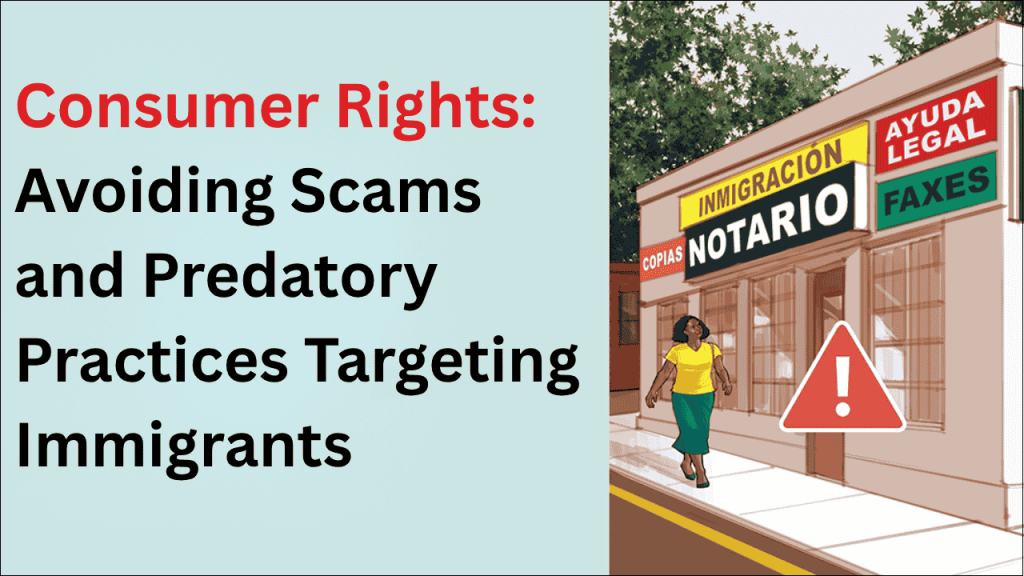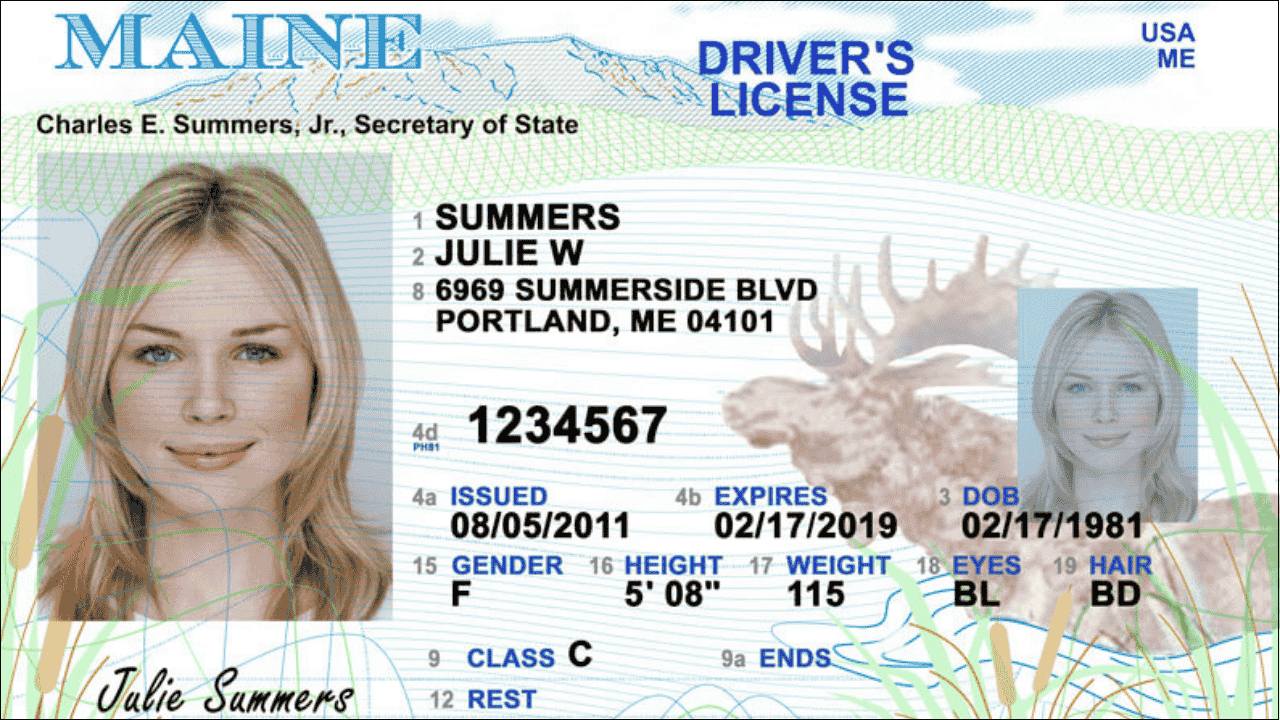
Immigrants often face difficulties while settling in a new country. Language barriers, unfamiliar systems, and financial pressure can make them easy targets for scammers and dishonest businesses. Scams and predatory practices can take many forms, including fake job offers, high-interest loans, or immigration fraud.
Table of Contents
Basic Consumer Rights
Consumer rights are protections given to people who buy goods or services. These rights apply to all people, including immigrants.
| Right | Description |
|---|---|
| Right to Information | A person has the right to know details about the product or service. |
| Right to Safety | Goods or services must be safe to use. |
| Right to Choose | A person should be able to pick from different options without pressure. |
| Right to Redress | A person can complain or get compensation if something goes wrong. |
| Right to Consumer Education | A person should receive education about their rights and how to avoid scams. |
Common Scams Targeting Immigrants
Scammers often trick immigrants by using fear, false promises, or complicated legal terms.
- Fake Immigration Agents
- Pretend to be government workers
- Ask for money to “speed up” visa or green card processing
- Use fear of deportation to pressure victims
- Job Offer Scams
- Offer jobs that do not exist
- Ask for money up front for job placement
- Use fake company websites or emails
- Housing Scams
- Collect deposits for apartments that are not available
- Use fake lease documents
- Disappear after receiving payment
- Loan and Credit Traps
- Offer quick loans with high interest rates
- Hide terms in small print
- Target those with no credit history
- Online Shopping Fraud
- Sell fake goods on social media
- Never deliver the product after payment
- Provide false tracking numbers
- Phone and Email Scams
- Pretend to be police or IRS agents
- Demand payment by gift card or wire transfer
- Threaten arrest or deportation
Tips to Avoid Scams
Simple steps can protect immigrants from most scams and harmful practices.
| Tip | Details |
|---|---|
| Verify Sources | Always check if a business or agency is real. |
| Avoid Upfront Payments | Do not pay in advance for promises like jobs, visas, or housing. |
| Check Contracts Carefully | Read all terms before signing anything, even in your native language. |
| Use Trusted Services | Use services recommended by community centers or government offices. |
| Keep Records | Save receipts, emails, and messages for future reference. |
| Say No to Pressure | Scammers often create urgency. Take time to think. |
| Learn the Local Laws | Understanding basic legal rights helps in avoiding legal traps. |
Predatory Practices to Watch For
Some businesses may not be illegal, but their practices are unfair or harmful.
- High-Interest Loans
- Very high repayment rates
- Confusing terms and hidden fees
- Often called payday loans or cash advances
- Unlicensed Immigration Help
- Notaries pretending to be legal experts
- Charge high fees with no real help
- Give wrong legal advice that causes problems
- Hidden Fees in Services
- Advertised prices that increase after agreement
- Small print that adds extra charges later
- Fake Legal Services
- Individuals claiming to be lawyers without a license
- Provide false hope or fake documents
- Aggressive Sales Tactics
- Pushing unnecessary products
- Refusing to take “no” for an answer
- Making offers that seem “too good to be true”
Legal Protection and Support for Immigrants
Many countries offer laws and services to help protect immigrant consumers.
| Support Type | How It Helps |
|---|---|
| Legal Aid Services | Provide free or low-cost legal advice to immigrants. |
| Consumer Protection Agencies | Handle complaints against fraud and scams. |
| Community Organizations | Educate and support immigrants through workshops and assistance. |
| Government Websites | Share verified information and tools to report scams. |
| Language Access Programs | Offer help in multiple languages for better understanding. |
Steps to Take If Scammed
Quick action can help reduce the damage if a scam does happen.
- Report the Scam
- Inform consumer protection offices or police
- Report to immigration offices if fake immigration agents are involved
- Stop Payments
- Cancel credit card transactions if possible
- Contact the bank or financial institution
- Gather Evidence
- Keep all emails, texts, and documents
- Write down names, phone numbers, and locations
- Get Legal Help
- Contact a legal aid center
- Avoid dealing with the scammer directly again
- Warn Others
- Share your story with friends and community groups
- Help others stay safe
Role of Community and Media
Community awareness can prevent large numbers of immigrants from falling victim.
- Community Workshops
- Offer training sessions on consumer rights
- Invite experts to talk about fraud prevention
- Radio and TV Programs
- Share warnings in native languages
- Reach people who do not use the internet
- Social Media Groups
- Allow sharing of real scam alerts
- Encourage support and questions from others
- Schools and Libraries
- Teach newcomers about safe practices
- Distribute simple guides on rights and warnings
Example: Scam vs Legitimate Service
| Feature | Scam Service | Legitimate Service |
|---|---|---|
| Fee Upfront | Demands full payment before service | Accepts payment after or with proper receipts |
| Contact Info | Only mobile number, no physical address | Official website, office address, and references |
| Written Contract | No written proof or only vague documents | Clear, signed contract in your language |
| Pressure to Decide | Pushes for fast decision, uses fear | Gives time to think, answers questions clearly |
| Proof of License | Refuses to show proof of qualification | Displays government license or registration |
Closing Perspectives
Scams and dishonest practices can hurt immigrants both financially and emotionally. Awareness and education are the best tools for protection. Every immigrant has the right to be treated fairly, no matter their legal or financial status. Learning the basic rights, checking sources, and asking for help from trusted organizations can make a big difference. Community support and open communication also play a strong role in reducing scams. Staying informed and careful can help create a safer environment for all.





